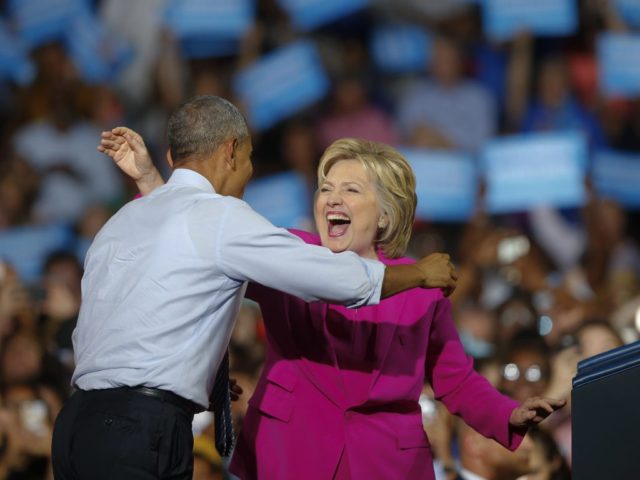On the day the House Select Committee on Benghazi subpoenaed Hillary Clinton’s emails, current Clinton campaign chairman John Podesta asked aide Cheryl Mills if it would be possible to keep Clinton’s email correspondence with President Barack Obama classified, citing executive privilege.
The revelation is in one of the thousands of emails hacked from Podesta’s email account and published online by Wikileaks.
On March 4, 2015, Podesta emailed Mills using the subject line “Special Category.” “Think we should hold emails to and from potus?” Podesta asked, using a common acronym for the President. ” That’s the heart of his exec privilege. We could get them to ask for that. They may not care, but I [sic] seems like they will.”
It is unclear whether Mills responded via email; Wikileaks has released the Podesta emails in batches of several thousand, and have on multiple occasions released replies to emails after publishing the original message in question.
There is also no indication in the currently available Wikileaks emails of what content existed in the correspondence between the President and Hillary Clinton that prompted Podesta to suggest they should remain private.
On March 4, 2015, the House committee subpoenaed the emails in Clinton’s private account, one that Clinton used despite having the proper security clearance to ensure that classified information only a Secretary of State and high-ranking officials should handle be kept safe. “The US House of Representatives’ Select Committee on Benghazi demanded all communications from Clinton related to the incident, in which a US ambassador was killed,” The Telegraph reported at the time, noting that Clinton had responded to the subpoena with a tweet that made the release appear to be voluntary.
“I want the public to see my email. I asked State to release them. They said they will review them for release as soon as possible,” Clinton tweeted of the release, without mentioning the subpoena.
The Select Committee had, at the time, uncovered two separate email addresses for Clinton, one a private address on which Clinton appeared to have been engaging in state business.
“This is why former Secretary Clinton’s exclusive use of personal emails to conduct official U.S. government business is so problematic and raises significant issues for transparency,” Jamal D. Ware, communications director for the Select Committee on Benghazi said in a statement then. “The American people have a right to a full accounting of all the former Secretary’s emails, and the Committee is committed to working to uncover all the facts.”
President Obama, The New York Times reported last year, had long denied that he knew Clinton was using a private server for government business. The existence of emails between himself and Clinton, using her private email, proves that there was no way of him not being aware of the private server – he had sent multiple emails to the private account.
The White House eventually made the Podesta-suggested move of invoking executive privilege, however, and those emails were never made public.
A recent revelation has also made it impossible to know whether the emails the White House barred from publication included a separate batch from President Obama through his own second email address, in which he used a pseudonym. The pseudonym was allegedly kept so private that even close Clinton aide Huma Abedin was reportedly unaware of its existence, according to a Politico report.

COMMENTS
Please let us know if you're having issues with commenting.